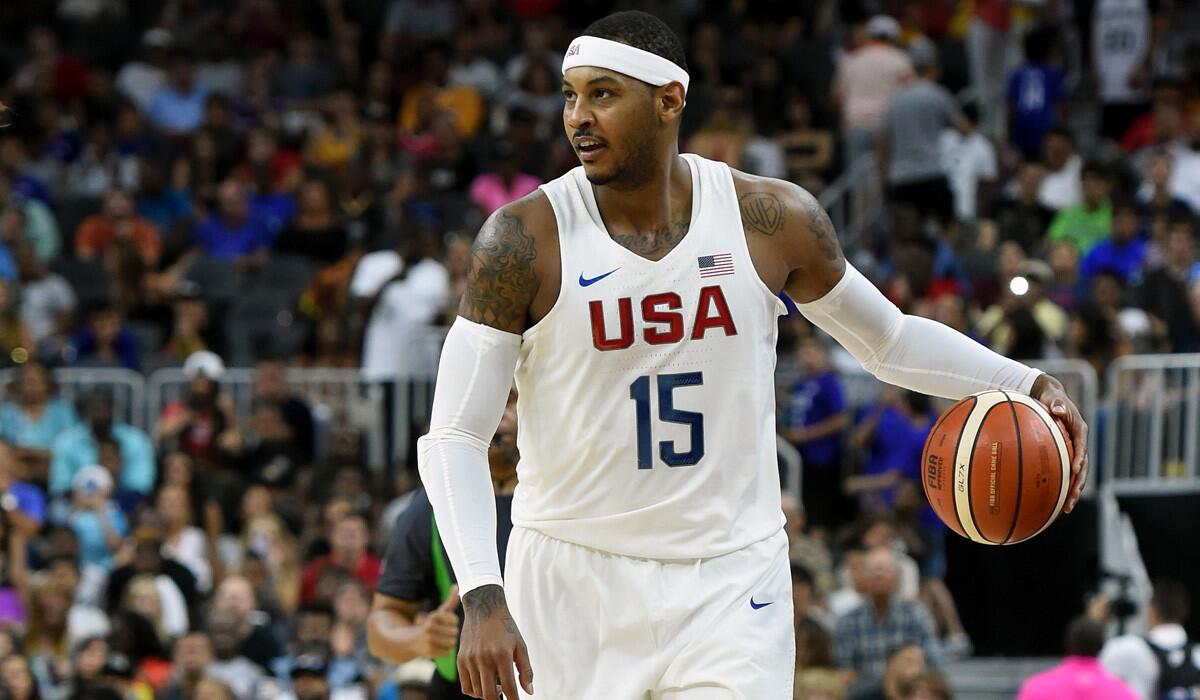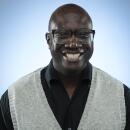USA Olympic, Knicks star Carmelo Anthony holds forum in L.A. about recent tragedies in the U.S.

Carmelo Anthony continued to use his powerful voice as a professional athlete to be heard and for his message to resonate about tension between African Americans and police during a forum Monday at the Challengers Boys & Girls Club in Los Angeles.
The New York Knicks star forward was in Los Angeles for a basketball game with the USA Olympic team on Sunday night and decided to team up with his national teammates, the USA Olympic women’s team, Los Angeles Police Department officials, community leaders and young people from the community.
Anthony said he wanted the town hall meeting to be an “open forum, open dialogue and honest conversations” about hopefully finding a solution to stop the country’s unrest.
“It was some very, very powerful messages being talked amongst not just us as athletes, but the youth,” Anthony said. “The youth really, really spoke out today about how they feel about their community, how they feel about police officers, how they feel about relationships and how we can mend these relationships.
“Both parties spoke. Police spoke. Youth spoke. Athletes spoke. And we got a lot of messages out of it today.”
Anthony said they broke up into groups that had athletes, police officers, community leaders and the kids from the community.
He said the strained relationships are not going to be solved “overnight.”
“I’m not going to change it by myself,” Anthony said. “I think it’s going to take a collective effort and it’s going to take time. But we have to start by talking about it, being honest with one another and not just pointing fingers at the officers or the officers pointing the fingers at us. … I think we need a direct dialogue with everybody.”
Earlier Monday, NBA icon Michael Jordan wrote a letter saying he “can longer stay silent” about the shooting of African Americans and the targeting and killing of police officers.
Jordan said he was contributing $1 million each to the International Assn. of Chiefs of Police’s Establishment Institution for Community-Police Relations and the NAACP Legal Defense Fund.
Anthony said that Jordan speaking out was “brilliant” and that it was “about time that he stepped up and said what he said.”
“At the end of the day, amongst us, he is our face,” Anthony said. “He’s an African American, a very powerful African American. So for him to step up in the midst of these times right now, it was very big on his behalf. It’s not always about money. But for him to step up and put his money where his mouth is, the timing was perfect.”
Tamika Catchings, who plays for the Indiana Fever and is on the women’s Olympic team, said there was some “tension” and “tears” shed over the two hours of the “Leadership Together: Conversation with our sons & daughters” among the almost 200 people, including those who ranged between the ages of 13-23.
She told the story of one young lady saying when she got off the bus for the intense sit-down meeting how she was “scared” when she saw the police “uniform” at the event.
“She was like, ‘I doubted I really wanted to be a part of it, but I’m so glad that I came because now I feel like I’m walking away with so much more than what I thought I was going to get,’ ” Catchings said. “So when you have conversations like this and you get feedback like that, we know we’re moving in the right direction.”
LAPD Deputy Chief William Scott said the issues are “so complex” that a two-hour meeting was not going to “bring solutions” right away. But Scott, the commanding officer of the Operations South Bureau, said some of the ideas suggested could be implemented.
“Some of these solutions are really simple: Respect. Respecting each other. Police officers respecting the citizens they serve and vice-versa,” Scott said. “So it’s a really simple issue, just kind of going back to the basics.
“But the issue is more complex. How do we deal with the history of law enforcement as it relates to African Americans and people of color? That one is a lot more complex, and how do we get past that? So, those are some of the issues that came up.”
broderick.turner@latimes.com
Twitter: @BA_Turner
More to Read
Go beyond the scoreboard
Get the latest on L.A.'s teams in the daily Sports Report newsletter.
You may occasionally receive promotional content from the Los Angeles Times.











